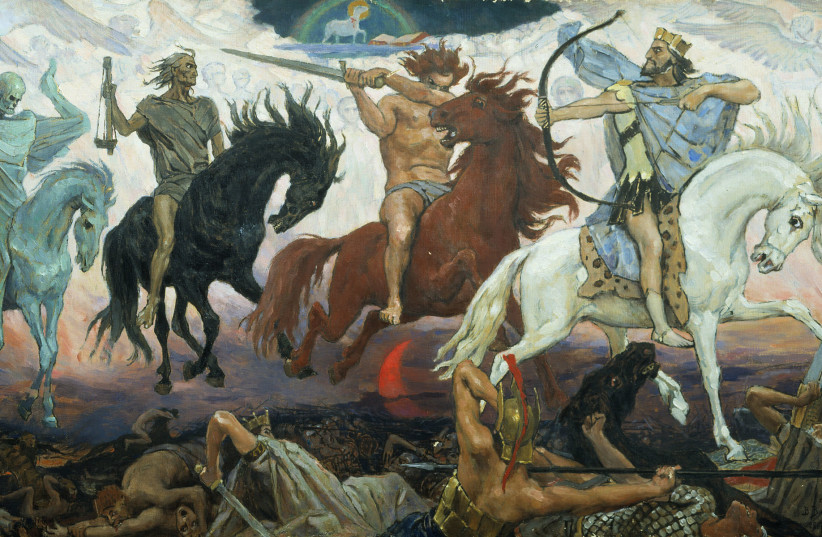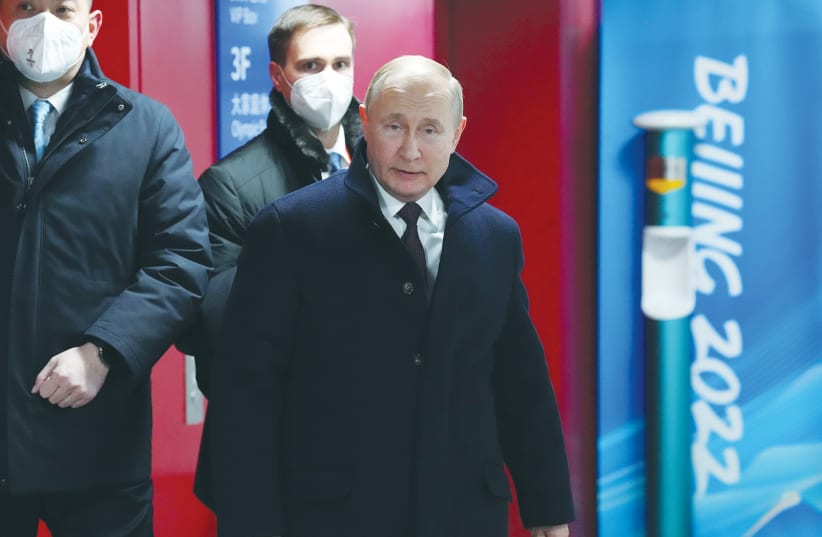The powerful Old Testament image of the four horsemen of the Apocalypse has been repeatedly brought back into discussion when humanity has faced peril and war. Ezekiel and Zachariah have often been interpreted as describing the four horsemen as plague, war, famine and finally death.
When I woke up this past week on the morning of 120 days of Russian President Vladimir Putin’s war in Ukraine, it struck me that we were nearing death: Death of the old geopolitical system and of the world order that has kept repeating itself from the medieval ages.
Despite much that has happened, Europe and Russia have risen as powers and then crumbled repeatedly. It seems,finally, that this cycle of plague, war and famine will be the last of Western hegemony and the birth of a new world order, a new world order which will probably bring back the balance of power to Asia and Africa, which were the centers of global wealth and power long before the industrial revolution.
Putin’s puzzle
CNN and other news outlets recently condensed Putin’s endgame in Ukraine as the re-establishment of Russia’s imperial, nationalistic identity. However, the Ukraine war seems to be a step in Putin’s plan of global dominance. Western intelligence agencies have often stated that Putin is terminally ill and has nothing to lose.


While war in Ukraine can be explained as a dying man’s desperate bid at carving out a legacy, the actual actions do not really marry this desperation. Despite losing men, weapons, generals and being under extreme sanctions, Putin continues to soldier on.
The question must be asked, what if Ukraine was not the endgame, what if Ukraine was a long game toward weakening the West? When we analyze biblical predictions, we should also analyze a lot of what-if’s.
Usually, what-iffery is a dangerous sport and leads you down paths that are slippery and often without fundamental logic. However, reading tarot cards or tea leaves is easier than reading the intentions of a man such as Vladimir Putin’s. This man is a veteran spy, former head of one of the world’s most determined and resourceful spy agencies, who has not only brought Russia back to power from its days under Yeltsin, but also been a field operative during the Soviet era.
Before Russia’s Ukraine invasion, Putin’s Russia had filled the gaps in conflicts worldwide and almost become a global arbiter in key geopolitical theatres where the US had lost control.
Afghanistan, Syria, Iran, Mali, Chad and Libya: Putin’s Russia was counted as a voice heard on every major decision. Russia had also become the big brother and tried to play peacemaker in South Asia, between India-Pakistan and China. Weeks before the Ukraine invasion, Russia had intervened in a bizarre coup attempt in Kazakhstan and assisted the Kazakh government in pacifying a revolt.
So, what has happened in the past weeks and months that suddenly made Putin risk all that capital built up over the past 20 years to take on Ukraine. Is it national pride or is it a longer-term strategy against the West?
Dragonbear: China/Russia alliance
The dragonbear alliance, of the Chinese dragon and the Russian bear, has not always been a love affair. Historically, Russia has always supported India over China and there has been strong animosity between these neighbors, who share a 4,250 km. land border.
Henry Kissinger’s strategy of empowering China was, in fact, to weaken Russia and now it seems after 50 years, this may have created a beast: a dragonbear that the US may not be strong enough to control.
Since Chinese President Xi Jinping’s rule, the Chinese strongman and the Russian autocrat have developed a strong bond. Both China and Russia have resented the US dominance in global affairs and during former president Donald Trump’s rule, Russia celebrated the fact that China bore the brunt of the erratic president’s ire. Trump’s withdrawal from the international arena allowed Russia’s and China’s global power to grow unchecked.
Then came the first horseman, the plague. The rapid spread of COVID-19 into a global pandemic can be firmly attributed to China’s negligence, lack of transparency and will to cover up. It also brought to light China’s control of international organizations, such as the World Health Organization (WHO), which were as much to blame for the cover-up and spread as the Chinese government was.
Western democracies suffered far more economically and socially than China, a single-party-controlled dictatorship. While western markets were decimated by public perception, China used this time to take firm control of Hong Kong, eliminate the one country-two systems pledge and destroy the power of billionaires who had started challenging Xi Jinping’s authority.
As the West grappled with vaccinations and tried to balance democracy and its citizens’ liberties with the need to protect the lives of their citizens, China stuck to a plan of lockdown and achieving complete political and social control of Chinese society.
What damage COVID did to China, we will never know. How many advocates of liberty disappeared, how many people really died and what really happened will probably be a mystery for generations to come.
On February 4, two men met under the umbrella of the Winter Olympics in Beijing. Putin and Xi announced a no-limits friendship between their two countries. Just when Europe had achieved some sort of control on the pandemic and as inflation surged, Russian missiles rained on Kyiv.
While Mario Draghi and his colleagues in Europe had declared “whatever it takes” to save the European economy, it seems that Putin had declared “whatever it takes” to ruin it. Oil prices hit a historic high and inflation become even steeper. Stock exchanges globally, which had just started recovering to pre-pandemic levels, started crashing again. The second horseman, war, had made his mark.
Famine and death
In October 2021, with heads of states meeting in Rome, at the G20 supply chain resilience was often discussed as a key point to combat Chinese aggression. Most heads of state were worried about electronics and chips, which were China’s domain.
No one was alarmed about food, except the Food and Agriculture Organization (FAO) and the World Food Programme’s (WFP) often ignored warning of drought and famine in Afghanistan, Yemen and the Horn of Africa. We are almost at the third horseman, famine. The world and Europe are on the brink of probably the toughest summer they have faced in generations.
Russia won against Nazi Germany using a scorched-earth policy. It would seem Putin’s strategy to tame Europe is similar. Curiously, the Chinese have been buying grain and stockpiling food since 2021. According to the report of Al Jazeera from February 2022, Russia and Ukraine together produce over 25% of the world’s wheat. Most of the produce of last year’s wheat is either in Russian control or out of Ukraine’s ability to export. As well, China is hoarding maize, soya and other calorie crops, while the supply lines of food to Europe are limited.
Another worrying fact is that while hunger may impact Europe relatively less, due to the EU’s financial resilience, there is a large risk that hunger in Africa will force increased mass migration to Europe by sea. Whether food is available in Africa or not, rising costs will create economic or natural famines in what seems to already be a very hot summer, forcing Africans to head to Europe in unprecedented numbers.
Between China and Russia, both control African politics enough to incentivize this. African Union’s President Senegal’s Macky Sall appealed to the West after his meeting with Putin in early April, to lift sanctions to facilitate wheat and fertilizer exports.
Depending on how this summer will progress, the sanctions on Russia may have to weaken to reduce pressure on the price of oil and gas to reduce inflation and to keep southern Europe’s governments from collapsing from unchecked migration from Africa, due to hunger.
Putin may, with his friend Xi, achieve global dominance through one relatively small war in Ukraine.
Death and a new global order
Ukraine just seems to be the first chapter of the death of the old world order. Russia seems confident it will bring the West to its knees by making oil more expensive in a hot summer where heatwaves will make it impossible to keep air conditioning off. If that isn’t enough, it will by pushing Africa to act on its behalf by creating hunger. After all, if the democracies can’t check inflation and enforce border security, governments in southern Europe will collapse.
Russia is not short of political allies it has developed in European countries, who may return to power on the platform of illegal migration, unchecked price rises, security and unemployment.
“And I looked, and behold a pale horse: and his name that sat on him was Death, and hell followed with him.” While we may be prepared for death, what we now need to understand is how we deal with the hell that follows.
The writer is the president of Glocal Cities. He is a political researcher, consultant and entrepreneur, and has worked in Europe, the Middle East and Africa for two decades. He has interacted with leaders and decision-makers, and has worked closely with people from all walks of life all over the Middle East.
